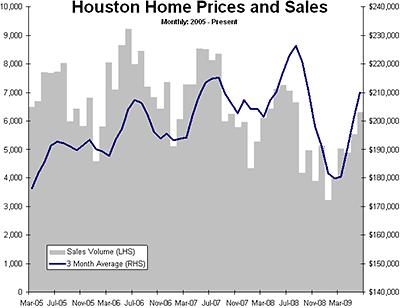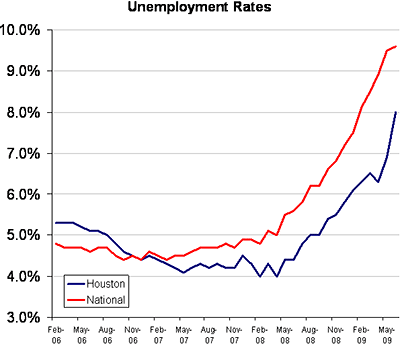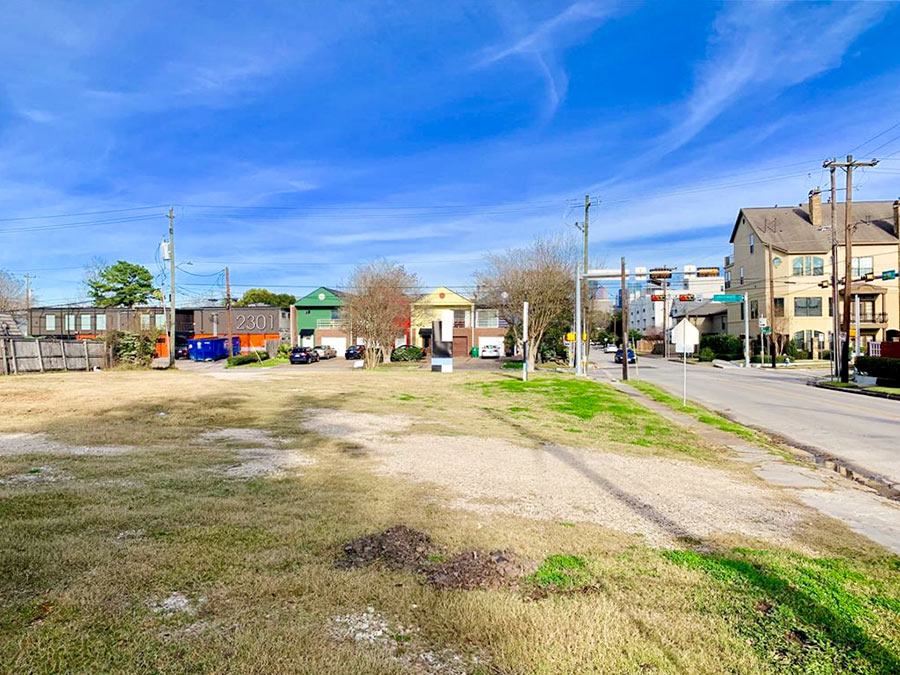

“The increase in local unemployment reported this week is sickening,” reports Swamplot’s local financial correspondent. But don’t the latest HAR numbers show Houston home prices at some sort of record high?
Historically, the peak for home prices comes in July or August every year. The increase in the median and average over the past several months has been due to two factors. First, seasonality –summer prices are always the highest. Second, a change in the “product mix†of Houston homes –the % of foreclosed homes has fallen every month for several months straight . . . So the change in the product mix means that the value of any given house probably has not risen, only a change in the product moving through the system is reflected in the numbers.
Is it okay to get excited about the foreclosures, then?
***
Foreclosed properties made up just 16.8 percent of property sales in June, according to the HAR report. That’s down from 19.9 percent the month earlier. Foreclosures made up more than one third of all sales as recently as January.
Says our correspondent:
. . . This apparent successful absorption of foreclosures is much better than expected. In other cities, foreclosures pile on top of each other with the entire market collapsing under the weight of distressed homes. It looks like we have passed a large number of foreclosed homes through the market process without a big disruption and adverse feedback loop. Some outer subdivisions have the foreclosure rot, but it is not pervasive.
That means everything’s hunky-dory in Houston, then, right?
At the margin, this observer is paying attention to the very guarded language in the press release and in the HAR.com video interview. There is no excitement in the voices of the HAR president and marketing director despite these “record†numbers. This strikes me as a realization that this environment is very transitory and we are a few months away from the next leg down. The clock is ticking on the 2009 summer selling season.
- MLS Report for June 2009 [HAR]
- Houston job losses hit 1987 level [Houston Chronicle]
- Houston home prices hit record high [Houston Chronicle]





We also need to add to the mix that the silly federal moratorium on foreclosures is getting ready to lift. Properties that should have been foreclosed on but weren’t will be entering the market. I don’t know how bad that will impact Houston though.
You can always depend on HAR to spin things to make it appear we are doing better than the rest of the country and everything is, indeed, hunky dory despite most assuming things are about to get hary scary.
As for the correlation between higher average home prices and higher unemployment rates, well, obviously the newly unemployed are busy buying up all the $2 million homes in Tanglewood under the new “no payments until 2012” loan program. Hey, it looks good on MLS.
Unemployment increases nationally are starting to slow but they will continue at an increasing pace here in Houston. This city is a lagging indicator. We were still going strong while the rest of the country was on a downward slide. And as a consequence, as the rest of the country starts to rebound, we will lag behind.
I think Matt’s right about the lagging indicator. We’ve been protected by the oil speculators who driven up prices, probably using our tax dollars from the TARP. Eventually we will have a repeat of last fall.
Stats in the bubble states are showing 80% of home sales are either first time buyers taking advantage of the many subsidies from the Feds, or investors buying foreclosures to rent out.
While stats are in short supply here, I imagine the absorption of foreclosures is due in part to the efforts of the numerous radio and TV infomercials, some locally produced, telling you how to get “cash flow” from foreclosures.
Judging from listening to these shows, I infer that a lot of the investors being brought in are inexperienced and undercapitalized (much talk of poor credit ratings and non-traditional loan sources). Some shows sound like they are even encouraging leverage. Such investors are not going to be very strong owners if the economy doesn’t improve or gets worse, with rents and house prices falling more. Many probably can’t even make up the difference if the rent doesn’t cover the note.
Man, I was just getting out from under the 1980s recession when this one came along. At least 1998-2004 were good to me.
Top of the Muffin to you!
I don’t think anyone can argue against the fact that HAR (like TAR, NAR and every other AR in the country) has a tendency to syrup up the numbers and sweeten the story.
But some of the points made in this post are objectively wrong, from a statistical standpoint.
For starters, the median sales price is used as the main price indicator specifically because it virtually eliminates any skewing of data by changes in the “product mix” that often results with average sales prices.
Second, the claim that this can be attributed to seasonality doesn’t stand either. When home sales are reported, the rise or drop in prices is a Year over Year comparison. At the same point in the home selling season last year homes sold for an median sales price that was less than that for 2009.
-kjb434 is right when he points out the moratorium effect. That will surely have an effect on foreclosures becoming a bigger part of the mix as auctioned properties make their way in the REO scene.
-Matt
That the Houston market is doing better than 90-95% of the rest of the country is not an HAR myth but a factual statement. All you have to do is look at sales everywhere else and compare. Now doing better than the rest of the country does not mean we’re doing great. We’re just in a much more solid footing.
-MikeRG
Oil speculation drove up prices beyond reality at $145+ per barrel. But now oil is at $65/barrel which is a realistic level considering supply and demand. So I’m not so sure the “lagging indicator” theory will play out in this case since you cannot extrapolate what CaliFloriNevada went through and conclude that we are coming up on cue, since the situation pre-bust here was a complete different story than those states.
I don’t think anyone can argue against the fact that HAR (like TAR, NAR and every other AR in the country) has a tendency to syrup up the numbers and sweeten the story.
_________________________________________
Especially when they allow false sales prices to be entered in on MLS and use those false sales prices to manipulate the figures with. Some get caught. But I doubt they are caught by HAR. More than likely they are caught by very upset buyers who don’t like the fact that a public record states they paid more for their house than they really did. Especially if HCAD has used the sales price from MLS.
As for being on more stable footing I suppose that is possible although it’s kind of hard to have stable footing in quicksand.
Erion:
Cannot agree with this point:
“For starters, the median sales price is used as the main price indicator specifically because it virtually eliminates any skewing of data by changes in the “product mix†that often results with average sales prices.”
This is objectively wrong. Both are subject to changes is the product mix. What has been happening elsewhere, and may be here, is that high priced homes are finally selling a bit at lower prices as buyers capitulate or as an REO where the bank wants to get it off the books, but that has nevertheless raised the median price. Exactly what’s going on here, we don’t know because… well that’s what the thread is about.
About the only reliabile price measure is repeat sales, like those used in the Case Shiller index that has tracked the home price decline in most major cites except here because the data is withheld.
As to oil, we’ll just have to wait and see. Demand has been dropping globally. Tankers are parked outside of major ports being used as storage tanks as investment banks find that they can make money by paying to store the oil because prices for future months are higher than the carrying costs plus the spot price. That only works and keeps all that oil off the market as long as there is a perceived higher future price. If, as you say, it’s at a stable price and that becomes recognized, there is no percentage in the speculators paying to store it.
The other possibility for oil is the second credit crunch that many expect. In a crunch, they would do like last year, selling contracts to raise cash and driving down the price. That’s why the price of gold collapsed last year during the worst part of the stock sell-off, just the opposite of what you’d expect in a panic.
– Matt
HAR does NOT allow entering wrong sales price information on the MLS. The violations in regards to this can be counted on one’s fingers and that’s not enough to “manipulate figures with” as you put it. Five or ten sales entered incorrectly out of 6300 wouldn’t even dent the median sales price. That’s not HAR saying that – it’s mathematics.
-MikeRG
The point in the post was that the rise in median sales prices was attributed to the drop in the percentage of foreclosures as a function of total sales thus changing the product mix. I have several issues with that. When the median sales price was falling 4-5 months back, no one was citing product mix as the reason. Prices were falling because they were falling. Back then however, foreclosures made up 1/3 of total sales whereas now they make up 1/6. As foreclosures dissipate the product mix change will cause rise the median sales price, there’s no argument there. But there should also be no argument that 6 months before that when the opposite happened to the foreclosure percentange, the opposite would happen to median sales prices also. In other words, product mix shouldn’t only be cited when prices are rising.
I agree with Matt that nobody can argue against the fact that HAR has a tendency to syrup up the numbers and sweeten the story